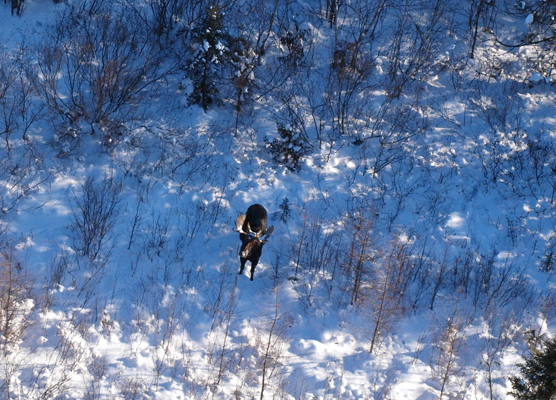|
You are viewing ARCHIVED content published online before January 20, 2025.
Please note that this content is NOT UPDATED, and links may not work. For current information,
visit https://www.nps.gov/aboutus/news/index.htm.

Contact: Dr. Steve Windels, (218) 283-6692 Voyageurs National Park plans to capture up to 14 adult moose to attach state-of-art telemetry collars in February 2010 as part of a continuing project to investigate the potential effects of climate change and other factors on the long-term viability of moose in the park. The project is a collaborative effort among scientists from Voyageurs National Park, the University of Minnesota-Duluth’s Natural Resources Research Institute (NRRI), and the U.S. Geological Survey. Collars will be outfitted with GPS receivers that will record each animal’s position every 15 minutes. A subset of daily locations will be transmitted to project investigators via the ARGOS satellite system, providing a remote system to monitor animal movements in near real-time. Standard VHF transmitters are part of each collar and can signal when a moose has died to allow quick retrieval of the collar and a determination of death, if possible. Each collar is also fitted with external temperature and activity sensors. The collars are capable of storing up to 14 months of location, sensor, and activity data. Collars will be retrieved when animals are recaptured in February 2011. Voyageurs National Park is concerned about the long-term viability of its moose population given recent declines in moose populations in other parts of Minnesota and adjacent Ontario. Among factors possibly causing these declines are chronic stress related to warmer summer and winter temperatures and lethal effects of parasites transmitted by white-tailed deer such as brainworm and liver flukes. “Moose seek cooler temperatures on hot summer days. We will use GPS radio collars to measure movement, activity, and habitat use by moose in Voyageurs National Park over the next two years,” said Dr. Ron Moen, Biologist at the Natural Resources Research Institute of the University of Minnesota Duluth. “We will be able to identify forest types that moose use as thermal cover when it is too hot for them to feed.” Nine females and five males will be captured using netguns fired from a single helicopter. Netted animals are carefully restrained to allow handlers to safely attach collars and collect data related to animal health. Blood and fecal samples will also be collected from each moose as part of a collaborative effort with the Minnesota Department of Natural Resources to assess moose population health throughout the State. The capture operation will be conducted by a private company, Leading Edge Aviation, that specializes in the capture of wild animals from helicopters. Wildlife veterinarians from the Minnesota Zoo and Minnesota Department of Natural Resources will also be on-site. Netgunning is a safe and approved technique for capture of large mammals such as moose. Voyageurs National Park protects a moose population of between 50-90 animals based on recent surveys. Twenty-five moose were sighted during anaerial moose survey completed in January. Six calves were seen and most bulls had dropped their antlers. It is difficult to see moose in late winter in the mixed conifer forests that cover much of the park. As a result, less than 50 percent of moose actually present are seen during aerial surveys. Personnel from the U.S. Forest Service and the Minnesota Department of Natural Resources assisted with the aerial survey. Two-hundred-eighty (280) white-tailed deer were also observed during the survey. Deer numbers have generally increased in northern Minnesota in the last 20 years. The study will assess changes in the relative number and distribution of deer within the park over that time. It will also examine the prevalence of brainworm and liver flukes in deer within the park. These parasites can be fatal to moose but rarely affect deer. |
Last updated: April 10, 2015
